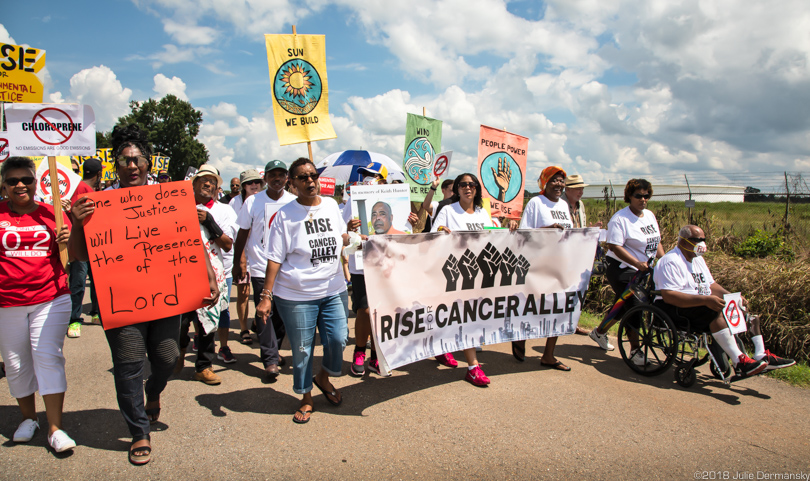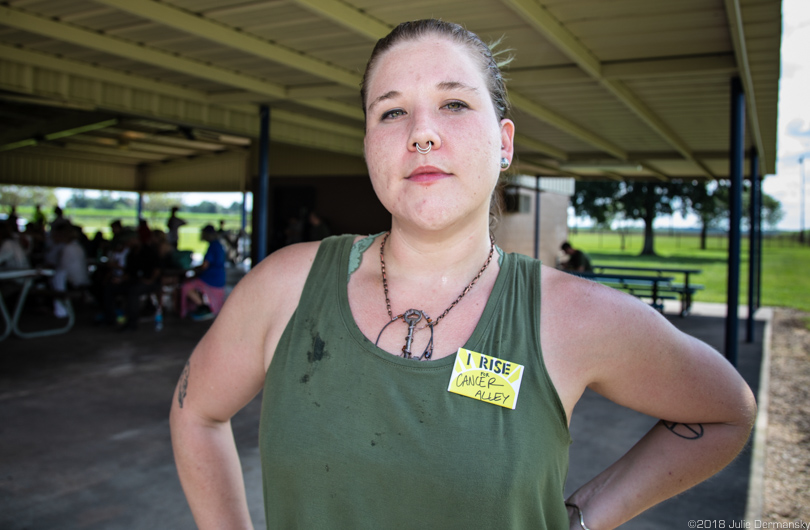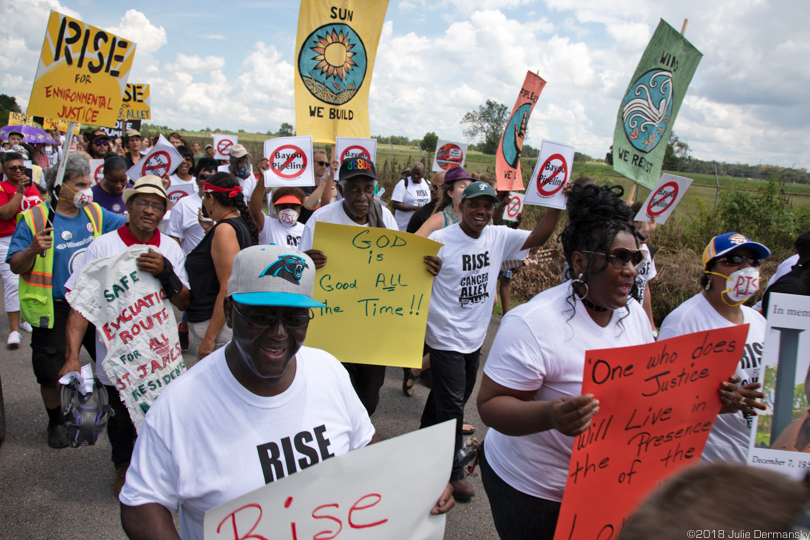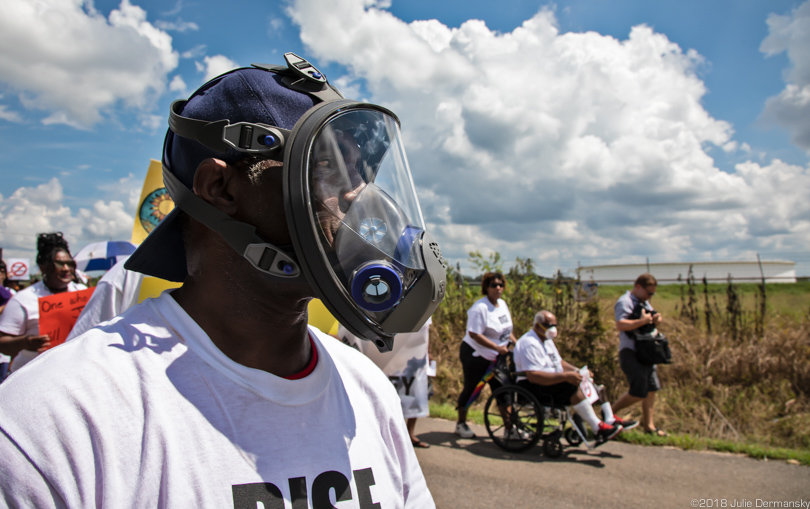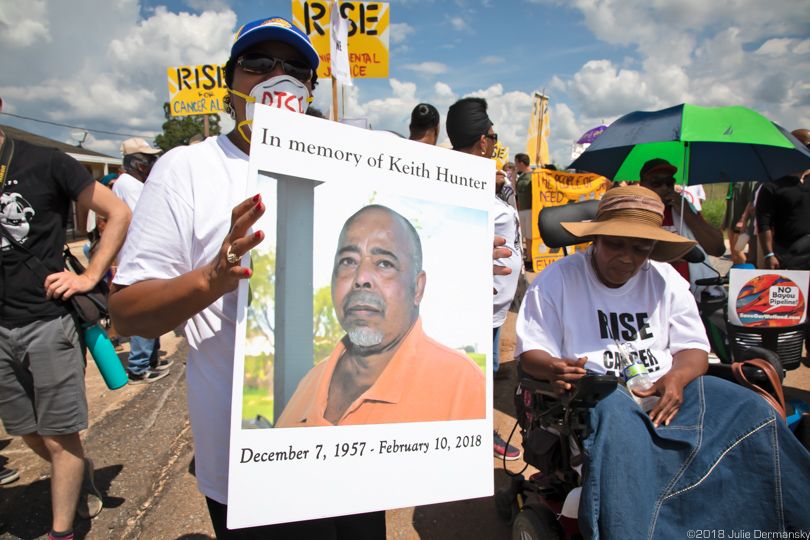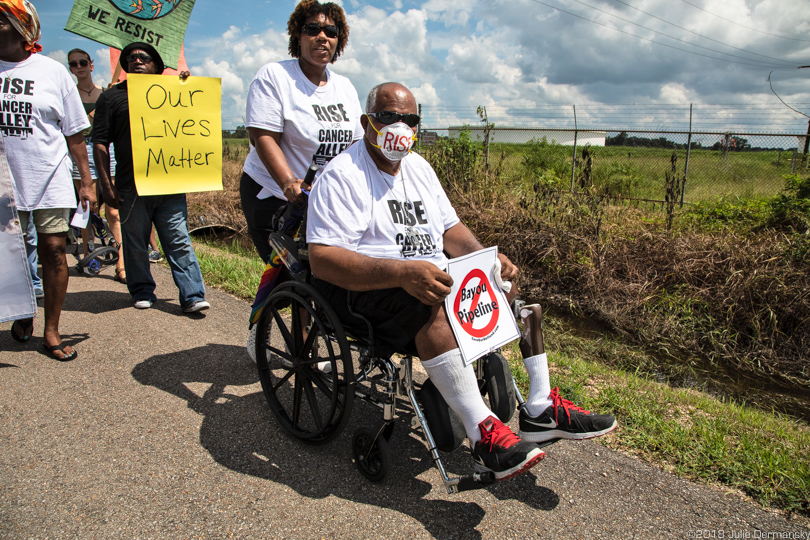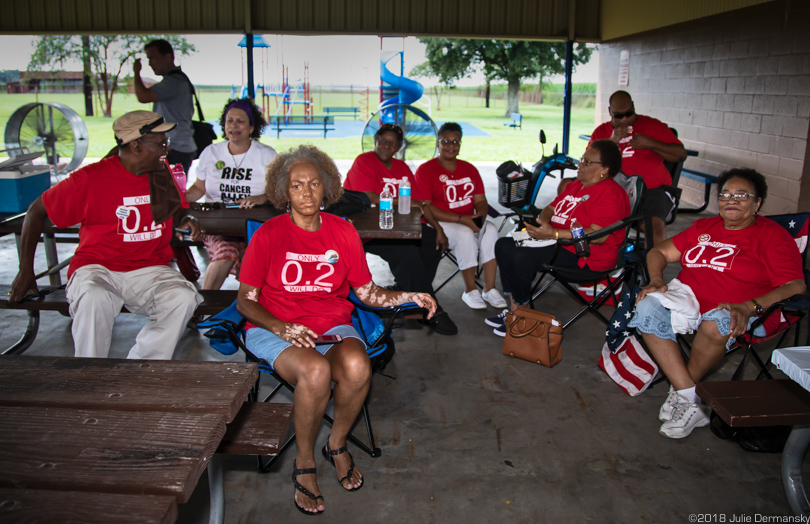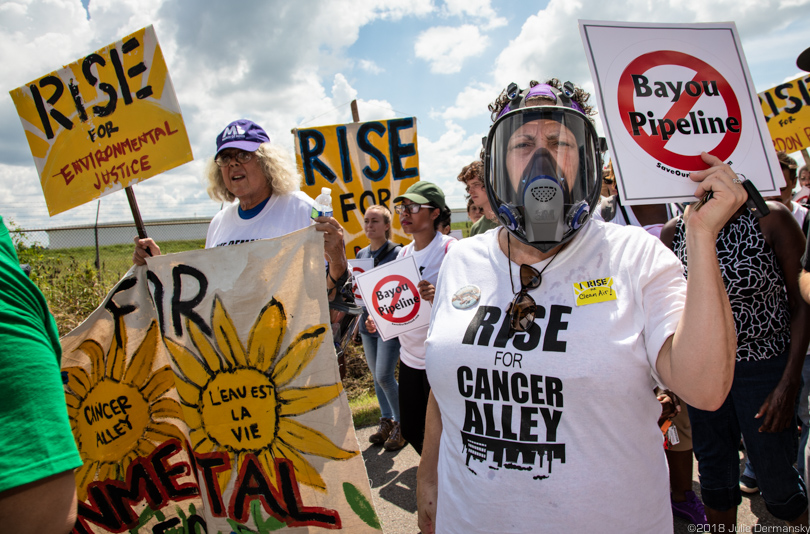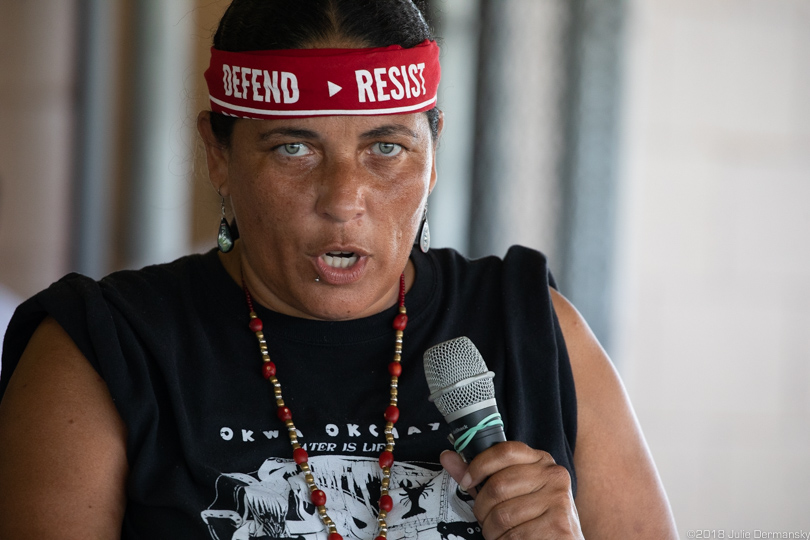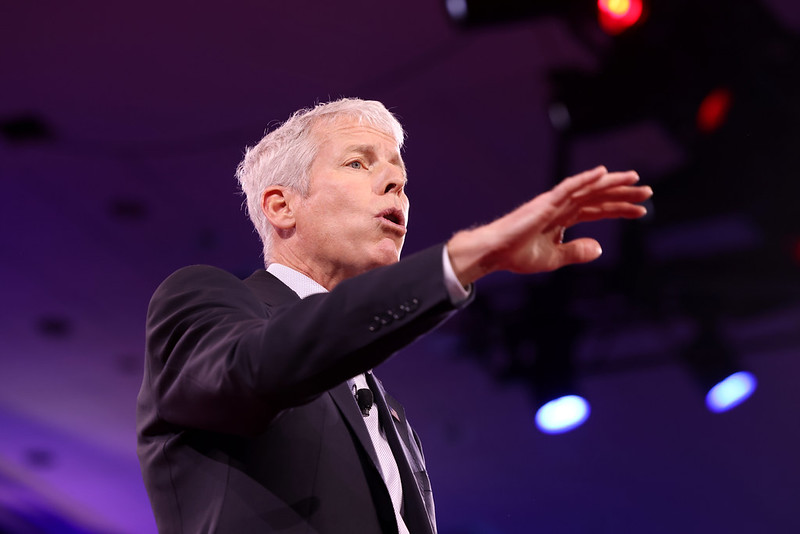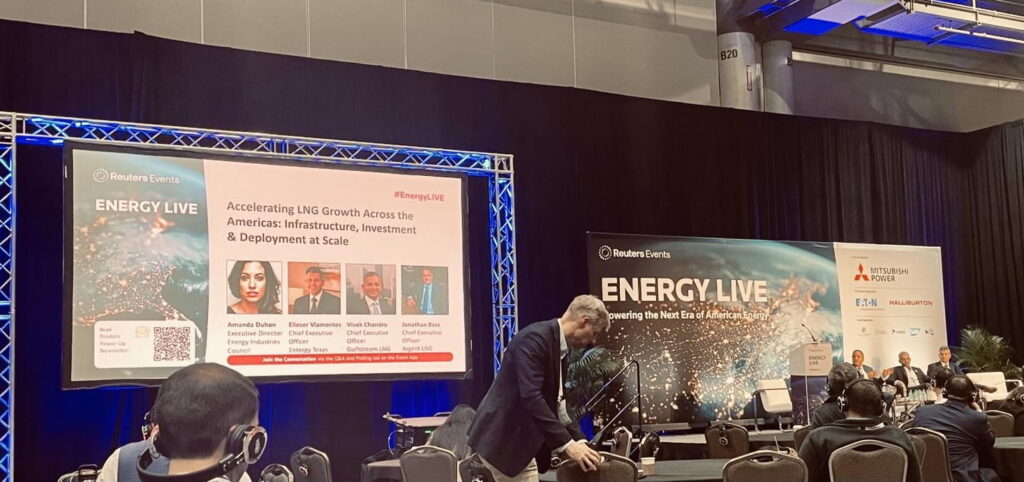On September 8, “Rise for Climate” events took place in 95 countries around the world, pressing leaders to take action on climate change and other environmental issues, a week before a global summit on climate change in San Francisco.
Thousands turned out at over 800 actions spearheaded by 350.org, an environmental advocacy group,
Alaina Boyett, a member of 350 New Orleans, a local affiliate of 350.org, organized two events dubbed “Rise For Cancer Alley.” Over 100 people were in attendance, which pleased Boyett. “Today Cancer Alley residents got a chance to tell their stories to a larger audience,” she told me, which was her goal. “I wanted to amplify the voices of people who often don’t feel they are being listened to.”
Alaina Boyett, at Rise for Cancer Alley event in St. James Louisiana.
March on Burton Lane in St. James, Louisiana.
350 New Orleans collaborated with the community organization New Orleans People’s Assembly to support a morning fair in Gordan Plaza, a predominantly middle class African-American New Orleans neighborhood built on top of a Superfund site where the community is pressing for relocation funds.
In the afternoon, they joined with HELP Association of St. James, to hold a gathering and march in St James, a predominantly low-income, African-American town of less than 1,000, where Energy Transfer Partners’ controversial Bayou Bridge pipeline will terminate, about 60 miles west of New Orleans.
Pastor Harry Joseph of the Mt. Triumph Baptist Church, a member of the HELP association, played an active role in the resistance against the Bayou Bridge pipeline. He was happy to see so many from the community turn up for the march. Though the group was unable to stop the 163-mile pipeline that cuts across southern Louisiana from being built, the community’s battle to secure an evacuation route is ongoing.
Pastor Harry Joseph during the march on Burton Lane, in St. James, Louisiana.
Sharon Lavigne, holding a picture of Keith Hunter, a resident of St James who spoke about environmental injustice.
Sharon Lavigne, a member of the HELP association and a resident in St. James, greatly appreciated the effort. Lavigne spoke publicly for the first time after a march in St James that went by oil storage tanks on Burton Lane. Burton Lane used to be the community’s escape route in case of an emergency, but it was closed off by an oil company that bought the land the road passes through. Lavigne expressed her frustration that the government is not protecting her community and called for the road to be opened to the public again.
She thinks the area she lives in should be known as “Death Row” instead of “Cancer Alley” because residents are trapped in their homes. Sometimes the air is so bad people don’t want to go outside, she told me. “We are waiting to be killed by cancer from all the pollution or by an explosion. If there is an industrial accident, there is no way out for us.”
“We will not be silenced about the institutional racism, the environmental racism that is coursing through the river parishes,” Lavigne said to the group that gathered after the march. “We are not just going to lie down and let the industrial plants kill us off.”
Milton Cayette, Jr. taking part in the Rise for Cancer Alley march in St. James, Louisiana on Burton Lane.
Lavigne’s brother Milton Cayette, Jr., also a St. James resident, took part in the march in his wheelchair. He is one of the community’s many elderly disabled residents who couldn’t leave quickly if there is a storm or industrial accident. He told me he wants the government to create an evacuation route that would give him a fighting chance to escape in case of a disaster.
Members of the Concerned Citizens of St. John the Baptist Parish in St. James at the Rise for Cancer Alley event.
Cindy Russo, wearing a gas mask during the Rise for Cancer Alley march on Burton Lane, in St. James, Louisiana.
About a dozen members of the Concerned Citizens of St. John the Baptist Parish, who live across the river from St. James, also participated in the Rise for Cancer Alley event. Cindy Russo, one of the group’s members, wore a gas mask as she marched past the oil storage tanks on Burton Lane. Though she doesn’t believe anything will change in Louisiana any time soon, she plans to continue doing whatever she can to bring awareness to the pollution issues facing all Cancer Alley communities. She told me that despite her belief that, “Whatever you say and whatever you do, it falls on deaf ears,” it is worth trying to educate people that “industry is killing us.”
Activist Cherri Foytlin, one of the founders of the L’eau Est La Vie Camp, also took part in the march along with others from the Camp. Foytlin too was pleased with the turnout. Public opposition demonstrations against the Bayou Bridge pipeline held in St James a little more than a year ago had half the number of people participating.
Cherri Foytlin speaking at the Rise for Cancer Alley event in St. James, Louisiana.
Foytlin pointed out that the fight against the Bayou Bridge pipeline is not over even though the pipeline is mostly in the ground. Legal challenges against permits at the state and federal level have yet to be settled, and a case challenging the pipeline company for beginning construction without properly confiscating the land after one of the landowners refused to make a deal with the company resulted in an injunction stopping construction today.
Meanwhile members of the L’eau Est La Vie Camp continue to hold direct actions to slow down the construction in the Atchafalaya Basin, a national heritage area, where the construction of the pipeline is still underway. Foytlin, who was recently arrested and charged with two felonies after a recent action in the Basin, described her arrest and three others who were arrested along with her as bogus. Her arrest won’t stop her from standing up and fighting back.
“I’m not leaving this for the next generation to fight,” she said. “To me it is a moral obligation.”
The fact more and more people are turning up to resist new industrial projects is what she thinks the government is the most scared of. That is why “ the government is trying to criminalize protests,” she told me. “They want to scare people away from the fight. They did it to Martin Luther King Jr, to Crazy Horse,”’ she said.
Pastor Joseph is hopeful his community, with the help of other groups, will be able to persuade local government officials to stand with the people and stop more industrial developments that will further pollute the area’s air and water. Though the coalition against the Bayou Bridge pipeline, which he played a part in, was unable to stop pipeline construction, he is now organizing to stop the Taiwan-based Formosa Petrochemical Corp. from getting a permit to build a $9.4 billion chemical manufacturing complex next to St. James.
He called on those at the event to join the HELP association at a public hearing on the Formosa complex on Sept 19 to save St. James from more pollution. The Rise for Cancer Alley event reminded Joseph that St. James is not alone. He expects a large turnout at the permit hearing later this month.
“We need our elected officials to do more about climate change,” May Boeve, executive director of 350.org, told PBS after the day’s events, a sentiment echoed during the gathering in St. James and in other locations around the world.
Main Image: Rise For Cancer Alley march on Burton Lane in St. James, Louisiana. All photos by Julie Dermansky for DeSmog.
Subscribe to our newsletter
Stay up to date with DeSmog news and alerts


